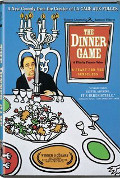
France 1999
Directed by
Francis Veber
80 minutes
Rated PG
Reviewed by
Bernard Hemingway

The Dinner Game
Synopsis: A group of smugly successful Parisian businessmen regularly host a dinner to which each must bring an "idiot" for the amusement of his jaded friends. Publisher Pierre Brochant (Thierry Lhermitte) invites Francois Pignon (Jacques Villeret), a minor tax official who builds intricate matchstick models in his free time. Brochant injures his back and is forced to cancel the dinner. Pignon however turns up and, grateful for the invitation to what he believes will become a book on his models, tries to assist Brochant. There ensues a comedy of errors as the hapless Brochant tries to get Pignon to help him to restore his unravelling world of deception.
When I saw this French mainstream comedy at the cinema I could find a wan smile here and there but laughter eluded me. Seeing it on video a couple of years later it struck me as a cleverly-written film with Jacques Villeret priceless as "le con". Veber, who directed this from his stage play, specializes in odd-couple comedies (La Chevre, Les Fugitifs, Les Comperes, and La Cage aux Folles as co-writer only) and this one follows the successful formula - take a wise guy and partner him with a nincompoop and follow them through a series of farcical encounters. This is his most stylish effort so far (the haute bourgeois setting makes it pleasing to the eye)and was one of France’s highest grossing films to date, and a winner of 3 Cesars. It keeps more closely than Veber's other films to the limitations established by its theatrical origins (most of the action takes place in Brochant's apartment and there are only a few establishing exteriors).
As with these kind of comedies, the moral is always about the reconciliation of opposites (probably the most genial version of this, and my favourite, being Steve Martin and John Candy in Planes, Trains and Automobiles). Whilst certainly playing with this, Veber chooses another option, focussing more on the moral awakening of the Brochant character although the penultimate scene with Pignon as the annunciating angel is an unfortunately hurried feel-good wrap.

Want more about this film?


Want something different?




